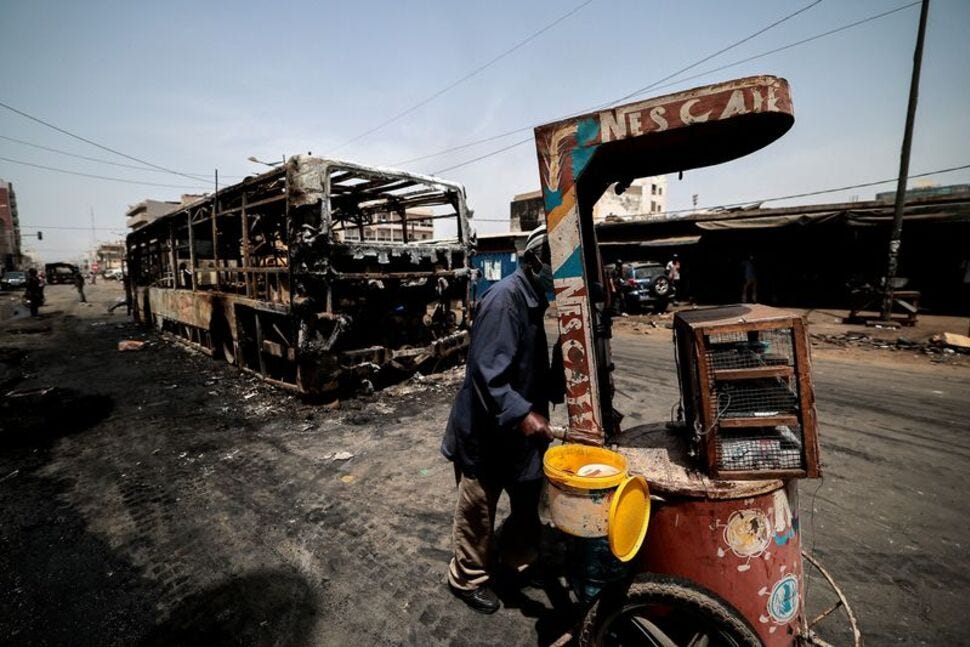Civil Strife in Senegal
The Struggles of W. Africa's Most Stable Democracy
“The organizer of a republic must find an arrangement which allows charges to be made against any citizen in the republic without fear and without respect to the individual’s position, and after a charge has been made and thoroughly examined, he must severely punish those making false accusations. Wherever this element is not well organized, great disorders always follow, because false accusations irritate but do not punish the citizens, and those who are irritated think about proving their worth by hating rather than fearing the things that are said against them.”
- Machiavelli, [Discourses, I.8]
Introduction: A Challenge to Democracy
The small West African nation of Senegal has been facing a wave of political unrest which has turned deadly, in a repeat of a nearly identical internal dispute just over a decade ago. At issue is the upcoming 2024 Presidential election, where President Macky Sall is expected to run for a third term, which is arguably legal due to constitutional changes, but would be a controversial decision. More importantly, opposition leader Ousmane Sonko has just been convicted of libel, and is further facing rape charges which Sonko and his supporters say are spurious and politically motivated. Many believe the purpose of this prosecution is to exclude Sonko from standing for office, and thus his supporters have hit the streets. For his part, Sonko is no longer participating in the legal process, making a standoff between him and the government inevitable. Further, the government is trying to build an enormous gendarmarie [a sort of police station] where they had previously pledged to build a high school, something which has angered youth in the area. A 15 year old girl was killed in these protests, which has further inflamed the usually peaceful country. Though Amnesty International has condemned the government’s use of force, there has been little global interest in the unrest. Senegal is a relatively poor country which hasn’t had natural resource wealth and isn’t key geostrategic location. However, for the time being, Senegal remains a rare democracy in a volatile region which has been racked by coups and has many military governments, and in a way it is “holding the line” on the Sahel’s instability spreading outwards. Hopefully a solution can be found which maintains Senegal’s civil and democratic government, but there is no easy path forward.
Background: West Africa’s Oasis of Stability
I will give a short background on Senegal, since I admit I struggled to find it on my globe when starting to research this article, though that is largely because it is a small country and the name is on a seam on my globe, so the text is somewhat distorted. Senegal sits on the extreme west coast of Africa, where the semi-arid Sahel meets the savanna; the Anglophone river valley country of Gambia splits Senegal down the middle, giving it an unusual shape, with a gap sort of like lips on a face.
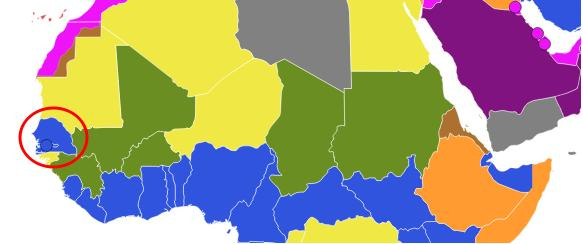
Since attaining independence from France in 1960 Senegal has been more stable than most of post-independence Africa. In fact, it is the only country in West Africa to never have a successful coup or have a civil war reach the capital. However, it has some of the problems which are common to the continent, especially a low level of economic development and widespread poverty. Like most of sub-Saharan Africa, Senegal has high population growth, 2.52% annually, and a very young population, with 41.19% of the population under 15. Of course, the anti-human Malthusians decry such population growth, but the truth is while such a young population presents challenges, it also presents enormous opportunity for the continent, which has actually long suffered from a shortage of human capital. The CIA Factbook lists 70% of the population as rural, while the World Bank lists the urban population at 49%; I do not know the reason for the disparity in their statistics.
In some ways, Senegal’s stability is curious. Perhaps in this regard it has benefited from its low amount of precious minerals, which can draw a lot of nefarious outside interest and be used to fund militias [such the RSF in the current conflict in Sudan.] Senegal does suffer from Africa’s “longest running insurgency” in the southern section of the country below Gambia, the Movement for the Democratic Forces of Casamance, who fund themselves from the illegal wood trade. However, there is a sort of ceasefire and the group does not seriously challenge the state, but instead function more like a bandit clan. Currently, Senegal’s top three exports, gold, refined petroleum, and phosphoric acid, are worth just over 2 billion a year, or only around $120 per person in this nation where the GDP per capita is around $1,600 according to the World Bank. Still, gold and petroleum are important sources of hard currency. However, there is currently an oil and gas boom in the making, as the country’s territorial waters have previously unutilized deposits.
Perhaps more important for stability, 95% of people in Senegal follow Sufi Islam, the most of any Muslim nation [2% follow other branches of Islam.]
Sufi Islam is frequently described as “mystical” and Africa’s animist traditions are said to be part of why Sufism, which grew in response to French colonization, had such unusual success in Senegal. Further, the four major Sufi brotherhoods in Senegal have a large amount of influence in society and act as a stabilizing force. The Salafi movement to which radical Islamic terrorist adhere is extremely hostile to Sufi Islam, thus, terrorists never found a firm recruiting ground in Senegal despite the nation’s poverty [in fact, the other 2% non-Sufi Muslims are not Sunnis either, though a small amount follow a 19th century Punjabi movement known as Ahmadiyya, which sends missionaries all over the world in a similar fashion to some Christian groups.] The country has been entirely spared from the explosion of terrorism in its region. However, it has been very active in regional peacekeeping missions, with 850 Senegalese troops under the auspices of the UN operating in neighboring Mali as of this March; 3 Senegalese peacekeepers were killed in a terrorist attack in Mali in February. An undated UN website refers to Senegal’s deployment of 1,200 police for peacekeeping operations as the largest of any country, and further says they are deployed in six theaters. Though Senegal is itself at lower risk of radical Islam, it has been the strongest native partner within the region in stopping the scourge of terrorism. Alternately, in 2015 President Macky Sall sent 2,100 troops to join the Saudi-led war on Yemen, seemingly using his government’s soldiers to buy the friendship of that wealthy nation, though that was also under the guise of fighting terrorism. While Senegal hasn’t had internal problems with terrorism, any instability within within the country puts it at great risk, and few countries in the region would be willing or capable to help if it finds itself in trouble.
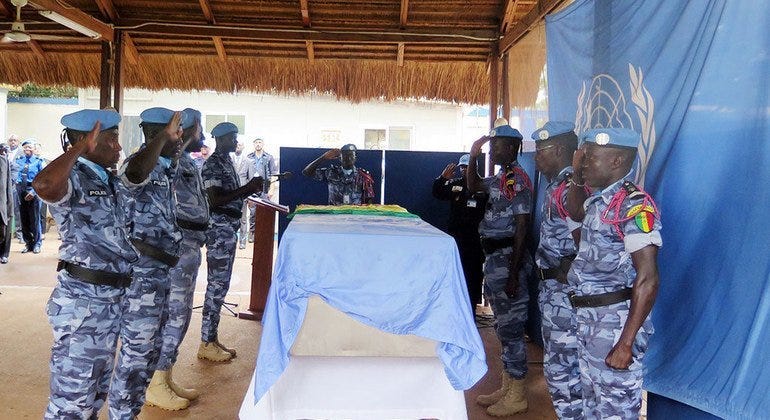
Overall, Senegal has a low international profile, which is a good thing on a continent that is primarily known to the outside world for its tragedies. In America there is an expression that is [incorrectly] said to be a Chinese curse that goes “May you live in interesting times,” meaning that life is very hard when things are interesting. Senegal has been blessed to not suffer any events which would draw the interest of the Western public. However, despite their country’s low profile, many Senegalese people have found international success in music and athletics.
The Incumbent: Macky Sall
Somewhat ironically, the current President of Senegal, Macky Sall, came to power the same way he could soon lose it: the prior President Abdoulaye Wade wanted to run for a third term after a constitutional change, but faced widespread protests led by Macky Sall. In this instance, Wade’s first term under the constitutional changes of 2001 was said to start in 2007, meaning he could run for a third term. There was much opposition to this, but the bigger problem was that Wade tried to change the election system so that anyone who got over 25% in the first round would become President- an effort he gave up following widespread riots. Wade won in the first round- he would have remained President if his changes had gone through- while the opposition solidified around Sall in the second round and he won by a large margin. Wade conceded his defeat to Sall, there was a peaceful transition of power, and months of tension were diffused.
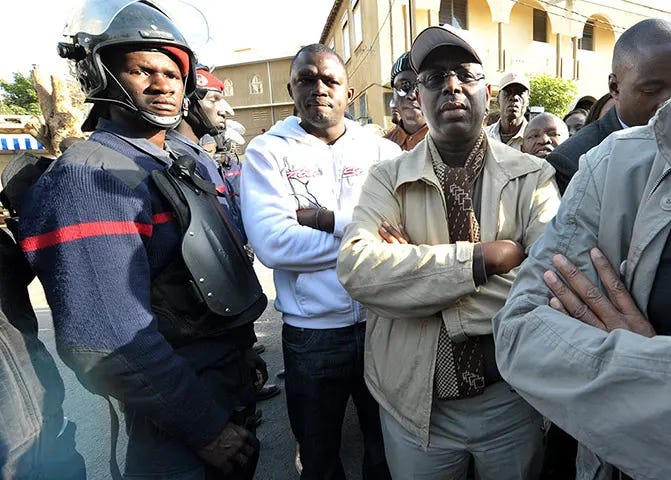
According to Macky Sall’s [surprisingly extensive] official biography, he was born in 1961 in the town of Fatick, where he later served as mayor. This makes him the first of Senegal’s President’s to have been born post-independence. He was briefly in a Marxist-Leninist organization in his youth, but left over disagreements with their ideology and strategy; instead he came to support the country’s mainstream left wing [it is often said these right/left classifications don’t apply the same way in Africa, but his official biography uses that terminology.] He went on to study geological engineering in the capital of Dakar and then in Paris, working in the petroleum industry upon the completion of his education. Sall entered government in positions relating to his specialty in engineering and resource extraction. After holding two ministerial positions he was appointed Prime Minister in 2004, which he held until 2007. In 2007 he was elected the President of the National Assembly. However, he caused himself many problems when he tried to summon the President’s son to testify before the Assembly, and his position as the President of the National Assembly was neutered while Vice Presidency of the Senegalese Democratic Party which he held was abolished entirely. He left office in 2008, forming the “Alliance for the Republic,” and thus becoming the opposition leader, which culminated in his victory in the 2012 Presidential election.
In office, Sall would “become what he always hated.” He started out popular, though with difficult problems to face including a severe food crisis. In 2016, constitutional reforms were passed lowering Presidential terms from seven years to five and limiting a President to two terms. However, it is in dispute whether his first term before the 2019 constitution counts as one of the two terms. In fact, Sall initially said he could not run again, but seems to have changed his mind. He hasn’t said whether he will run, but it is widely believed he will. The opposition, for their part, is sure his running would be “illegal and illegitimate.” A large group of civil organizations has joined together to oppose him running for a third term. Meanwhile, the CIA Factbook appears to say it would be legal for Sall to run for a third term, though it is phrased in a somewhat confusing way. The CIA Factbook’s description reads,
“A 2016 constitutional referendum limited future presidents to two consecutive five-year terms. The change, however, does not apply to SALL's first term. In February 2019, SALL won his bid for reelection; his second term will end in 2024.”
It is unclear the exact relationship the CIA Factbook has to US policy [in terms of it is generally used to set policies or is written to reflect policy] but you can be sure if the Biden Administration decides that Sall shouldn’t have a third term this description will change. It is reported that former US President Obama, who led the US during the first years of Sall’s presidency, was quietly dispatched by Biden to talk Sall out of running for a third term. This indicates that the Biden Administration is uncomfortable with his rule continuing, though it is unclear what they may do to try to stop him.
After the 2019 election, Sall began to consolidate power. Most notably, just two months after the election he passed a constitutional amendment abolishing the position of Prime Minister. In 2022 he reinstated the position following a defeat in Parliamentary elections. However, he put the new PM in charge of the cost of living problem, which one assumes he did simply to have a fall guy for a difficult issue. Amnesty International released a report in March of 2023 about increasing political repression in the country. I don’t generally trust that organization, but the protests seem to confirm that the public is concerned about politically motivated prosecutions, most of all of Ousmane Sonko.
The Opposition: Ousmane Sonko
At the heart of the current unrest is the opposition leader, 48 year old Ousmane Sonko who hails from the southern Casamance region. The young looking Sonko, a former tax inspector, is known as being a forceful and incisive speaker who is well dressed and telegenic. Overall, he is what you would call “charismatic,” though that word is often used in a condescending tone by elitists who write op-eds and work at think tanks. Sonko is currently the mayor of the southern city of Ziguinchor. He came in 3rd in 2019’s Presidential elections, but has grown in popularity among Senegal’s enormous youth population, and has remained an anti-establishment figure as other losing candidates were taken into government or brought down in financial scandals. It is easy to see his appeal, especially on a youthful continent plagued by elderly politicians [though Senegal’s 2016 constitutional change prevents those over 75 from being President.]
Sonko has been facing serious legal problems since he was accused of rape in early 2021. This resulted in large scale protests at the time, and has not reduced his popularity among his supporters, who believe he is innocent and it is a ploy to keep him out of office. Further, he has recently been convicted of libel, which may not restrict him from running for President, though a rape conviction would.
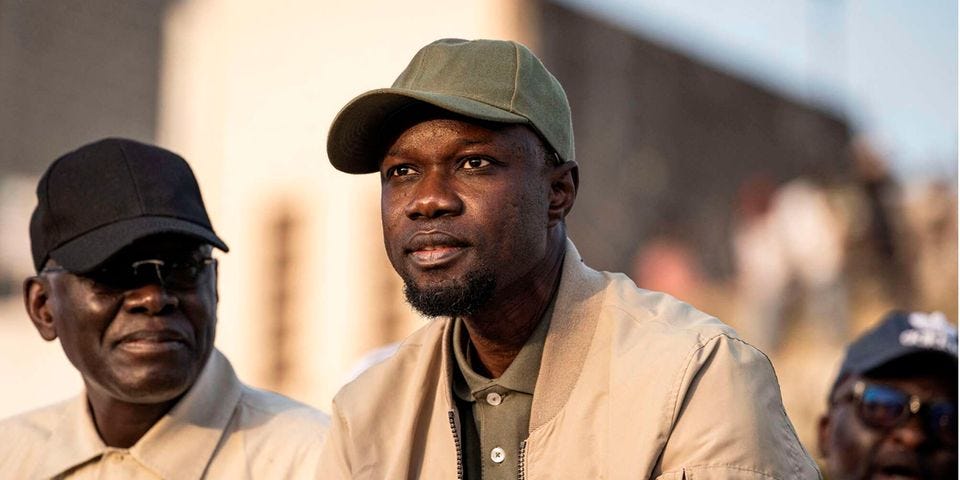
To start with the libel charge, at issue is that Sonko accused the Tourism Minister Mame Mbaye Niang of embezzling an enormous $47 million dollars. No one disputes that Sonko made this accusation, which he did publicly at a news conference. He stands by the accusation, but the courts found it defamatory. It seems plausible that Sonko, a former tax inspector, would be well qualified to identity such a crime. Alternately, he would know how to make credible sounding false accusations. Sonko was initially given a 2 month suspended sentence, which would not impact his ability to stand for office. However, it was extended to 6 months on appeal, which could make him ineligible to vote when the elections take place and thus disqualified. The incredible thing is that Sonko was ordered to pay Niang $336,000 [200 million in the national currency, West African francs.] Senegal’s average salary is $170 a month, meaning this is almost 165 years worth of wages for the average Senegalese worker; Sonko was a government employee, who average $130 a month, meaning it would take 215 years of wages to pay. According to the US Social Security administration’s most recent numbers, the US average wage is $60,575, meaning at US income levels this fine would be almost 10 million dollars. A judge can imprison Sonko if he does not pay, which he is clearly unable to do. Americans may recoil at the thought of libel being a criminal matter, but this is not functionally different from a judge applying egregious fines in a civil libel case.
As to the rape charges, in February 2021 an employee at a beauty salon accused him of raping her and making death threats after she gave him a massage [he apparently got a message at a salon because he could not afford a massage therapist.] He was arrested, and there were widespread protests at the time, with one young supporter saying, “It is a political liquidation. He did not commit rape. We have clear proof that Sonko did not rape this woman.” Sonko appeared in court on March, 16 2023 and Dakar was paralyzed by widespread protests. He claims the government tried to assassinate him on the way to court after he was sprayed with a strange substance.
In early May, Sonko announced he would not cooperate with the trial. On May 16th he was supposed to appear in court, but it was adjourned after he did not show up. Al Jazeera reported that Sonko said, “It is no longer justice, it is judicial banditry, and that is why I made the decision, still within the framework of my civil disobedience campaign, to no longer collaborate with this justice.” He claimed he would go to court if he got a “security guarantee”, but it seems unlikely he would believe such a thing if offered.
Both the libel and rape charges are hard to get a handle on from outside. It is important that such things be publicly adjudicated in court, but many believe the judicial system is unfair and is not independent. Of course the government of Sall is praising the judiciary. The rape charge is especially unfortunate, as women are frequently sexually assaulted, including by politicians, and deserve to be taken seriously when they come forward with an accusation. However, it’s also highly plausible the woman was paid and this is politically motivated. Further, since Sonko is a good looking guy, I’m sure there is a lot of misogynistic commentary about how “He wouldn’t need to rape someone.” Overall the whole thing is bad for the status of women in the country. I’m sure for the most part the entire country falls on a partisan side, because Sonko refusing to appear in court looks bad to anyone who isn’t sure of his innocence and of the court’s corruption. This makes a civil resolution difficult. In 2021 a rapper and activist named Fou Malade told DW,
“The problem today in Senegal is justice. We have a justice system that is not at all independent. A justice system that is used to eliminate opponents, to eliminate activists, to eliminate anyone who might contribute to the awakening of consciences."
Due to my skepticism of government I lean towards the idea that he is being set up for a sham trial, but it is also unfair to dismiss the woman’s claim. As Safiatou Diop, the head of a network of women’s organizations told DW for the same article,
"Whether the government or the opposition, these politicians have entered into a political battle with unconventional weapons. It is unacceptable for political actors who are at odds to use a woman to neutralize each other."
This shows the crucial importance of trust in an independent judiciary, but also how hard it is to maintain. Meanwhile, the opposition keeps taking to the streets.
Peaceful Protests Grow Violent
There have been large protests in Sonko’s defense at each stage of the legal process. As his jeopardy has grown, he has encouraged ever more public resistance. This round of protests started in earnest at the time of his libel trial in mid-March. The police response became more violent, leading to businesses closing as police shot stun grenades and teargas at rock-throwing protestors. Protestors burned tires in the streets and a supermarket was set on fire.
At the beginning of May, Sonko called for civil disobedience against the judiciary. Then, a second event converged with the discontent about Sonko’s trial and general political repression. In the fishing village of Ngor just outside of Dakar the government announced plans to build a gendarmerie where a high school was supposed to be built. “Gendarme” is a French word for military police, though their function varies by country [the use of military police in civilian matters is common in much of the world, the prohibition on using the military for domestic law enforcement in the US is an anomaly.] Senegal has both a National Police Force and the Gendarmerie, with the Gendarmes being more like State Police in the United States. According to an episode of The Africanist podcast featuring Senegalese freelance journalist Borso Tall, Ngor had not had a gendarmerie in some time, as they were expelled from the prior building by the owner who wanted to do renovations. I was surprised and impressed that Senegal has strong enough private property rights that it is possible for a landlord to evict the gendarmes. However, Ngor also does not have a high school, so this is not just parents complaining about an outdated facility, there is a serious need for the previously planned use of the property.
The proposed facility was around 6000 square meters, which is incredibly excessive. The youth protested in large numbers, and though Macky Sall intervened and said the property would be split between both uses, the protests did not stop. As protests escalated, police are said to have fired live rounds at protestors- Senegal is not a violent country, so this sort of police brutality is not common. A 15 year old girl was killed- seemingly by a boat’s motor blade- after she dove into the sea to escape police violence.

The government pushed back Sonko’s trial date, in the hopes of calming the situation. However, Sonko is still not attending the trial, and at all times is surrounded by a large body of protestors, hoping to protect him from arrest. For the time being, it does not seem anyone will back down enough to resolve the situation, and a fair election where Sonko stands as a candidate is the only clear solution. Protests are sure to continue.
Conclusion: No Easy Solutions
In terms of governance, Senegal has bucked every trend in post-independence West Africa. True, it has remained poor by global standards, but has had consistent civil government, general peace, and has avoided being a battleground for superpowers. Now, with civil government falling across the region, an explosion of terrorism, a new Cold War over Africa between the US and Russia, and incoming oil revenue, it is a bad time for domestic instability. This is far from unfixable, but the solution is not obvious. It’s true that Senegal had similar problems back in 2012. However, Wade’s attempt to change the electoral system was only to help himself and didn’t incriminate anyone else, though it was just a ploy to stay in power.
Try to imagine yourself a pure partisan of either side in this dispute. If you support Ousmane Sonko, the government is corrupt enough that at the first democratic challenge it criminally charges a man and fines him an insane amount for pointing out real corruption on a massive scale, and then further will generate spurious rape charges and tries to put him in prison for years. Of course that would not just incriminate President Sall, it would mean the judiciary was corrupt. On the other side, if you support Macky Sall and Sonko were to be successful it would mean that a man who tells egregious defamatory lies and is an actual rapist can avoid justice and become President by getting the masses into the streets to subvert justice. Sall has a degree of plausible deniability since he can say he was simply letting the independent courts function, but much of the population won’t believe that, and the ones who won’t are part of a rapidly growing youth population. With a large segment of the public not trusting the independence and legitimacy of the courts this is difficult to solve, and Sonko refusing to participate in the legal process makes it potentially fatal.
If you imagine the worst intentions of either candidate, Sonko is just a bad person- and rapist- trying to grasp political power. Sall is a lot harder to understand, though perhaps he did just become addicted to power. At the same time, he hasn’t passed any sort of “point of no return” in terms of peacefully retiring. In fact, with his expertise in oil and gas engineering and political connections he could find outrageous personal profit leaving office and becoming a business leader in the oil and gas boom. If Sall is directing the unfair prosecution of Sonko it’s unclear why he should do that when after a fair election loss he could leave and make such profits. Surely Sall is not that offended by Sonko going after the Tourism Minister, as that is not that important of a position and probably mostly oversees resort licenses. He is perhaps just irrationally seeking to keep power, a vice many men fall into. Though Sall didn’t found Senegal’s democratic republic, the following Machiavelli quote is relevant to pondering his actions:
“In the end, almost all men, deceived by a false good and a false glory, allow themselves, either willingly or through ignorance, to pass into the ranks of those who deserve more blame than praise, and having the capacity to create, to their everlasting honour, either a republic or a kingdom, they turn to tyranny, failing to realize how much fame, how much glory, how much honour, security, tranquillity, and peace of mind they are losing through this choice, and how much infamy, disgrace, blame, danger, and anxiety they incur.” [Discourses, I.10]
To me, looking at it from the outside, protecting Senegal’s democracy benefits Sall a huge amount and has no drawbacks, while abusing the law for power is trecherous. Has he been corrupted by a desire to be a tyrant, or is he really letting the justice system pursue legitimate charges against Sonko?
Senegal is in a position where it may become more important to the world at the same time it is least able to protect itself. We all know what those with power will do for fast profit from oil and gas, and that is but one major global issue it stands on the edge of. Unfortunately for Senegal, it is possible the Senegalese are about to live in interesting times. The best case scenario is that charges are withdrawn in a credible way and Sonko is allowed to stand for a fair election.
Thank you for reading! If you enjoyed this content please subscribe and share. My main content will always be free but paid subscriptions help me a huge amount [payment in West African francs preferred.] I have a tip jar at Ko-Fi where generous patrons can donate in $5 increments. Join my Telegram channel The Wayward Rabbler. My Facebook page is The Wayward Rabbler. You can see my shitposting on Twitter @WaywardRabbler.



